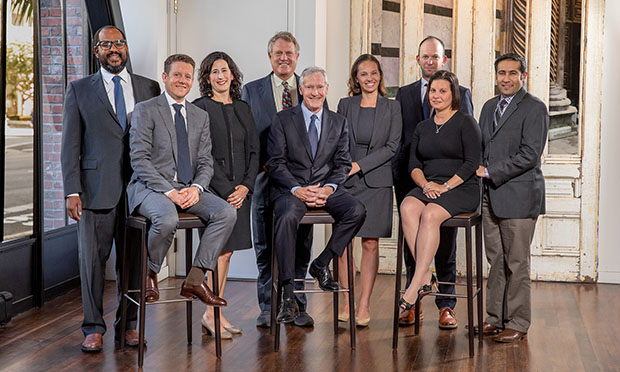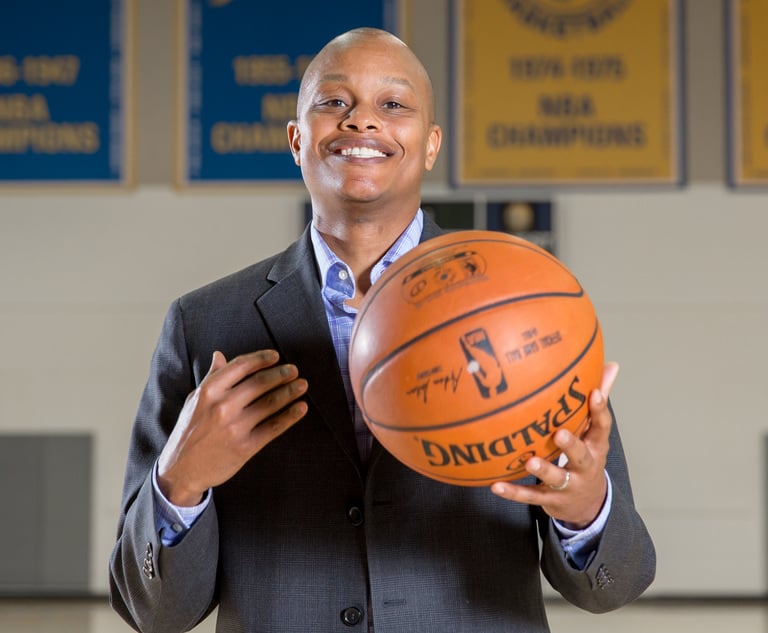Tech Litigation Department of the Year Finalist: Keker, Van Nest & Peters
"Lawyers here thrive working on high-stakes, difficult-to-win cases that require novel approaches and fair bit of grit," says managing partner Steven Taylor.
October 28, 2019 at 12:30 PM
6 minute read
 (L to R) Khari Tillery, Matthias Kamber, Jo Golub, Elliot Peters, Bob Van Nest, Lizzy McCloskey, Jamie Slaughter, Tina Sessions, Paven Malhotra of Keker, Van Nest & Peters. (Photo: Jason Doiy/ALM)
(L to R) Khari Tillery, Matthias Kamber, Jo Golub, Elliot Peters, Bob Van Nest, Lizzy McCloskey, Jamie Slaughter, Tina Sessions, Paven Malhotra of Keker, Van Nest & Peters. (Photo: Jason Doiy/ALM)
Keker, Van Nest & Peters partners Jamie Slaughter and Adam Lauridsen led a team that successfully defended Electronic Arts Inc. against class action claims from retired NFL players arguing that the company used their likenesses in the Madden NFL video game franchise. Robert Van Nest, Matthew Werdegar, Gene Paige and Matthias Kamber defended Google against trade secret misappropriation and patent infringement claims related to its Project Loon, which uses balloons in the stratosphere to provide wireless services. Paven Malhotra and Ryan Wong won a ruling at the Alabama Supreme Court for Facebook limiting the circumstances where courts can assert jurisdiction over internet companies for their content moderation decisions. And the firm represented Google in arbitration against former autonomous car chief Anthony Levandowski and the co-founder of Otto, the company he sold to Uber. Uber's IPO filings indicate that Google won a $128 million award in the arbitration—an award pending confirmation in California state court.
That slate of cases landed Keker as one of six finalists for the Tech Litigation Department of the Year as part of The Recorder's California Leaders in Tech Law and Innovation Awards. The winner will be announced at a ceremony celebrating all winners and finalists Nov. 6. Managing partner Steven Taylor recently discussed how the San Francisco litigation boutique is keeping up with changing trends in the market for litigation services.
What are the distinguishing characteristics of litigators that practice at Keker?
Steven Taylor: Excellence, ambition, creativity and teamwork. And a good sense of humor. We are a group of individuals with diverse backgrounds and interests, each of whom is accomplished, and together we are committed to achieving excellence for our clients. Lawyers here thrive working on high-stakes, difficult-to-win cases that require novel approaches and a fair bit of grit.
When a client comes to Keker for representation on a piece of litigation, what can they expect?
The best lawyers devoted to solving their most difficult problems. We invest time in understanding our clients, their operations, technology and goals to tailor our representation to their objectives. We're aggressive and passionate advocates, but also thoughtful representatives for our clients. Clients tell us often that they can find good lawyers, but it is much harder to find good people too, and our firm is the right combination of both. We want clients to be proud to have our lawyers represent them and their companies.
Our case teams are often much smaller than our counterparts, and everyone, senior partner to junior associate, plays a significant role in the case. Clients come to know, trust, and rely on our entire team. We think this approach allows our case teams to provide superior advocacy and service to our clients.
How does your firm gauge success on any particular litigation matter?
Each case has a different specific measure of success, but generally we ask: "Did we meet or exceed our client's expectations? Did we accomplish the client's goals?" Of course, we want to win a case, we are trial lawyers after all, but ultimately we want to do right by our clients. Sometimes that means aggressive trial advocacy through a verdict, but other times it's negotiating a quick settlement, or shielding them from government prosecution. We want our clients to walk away knowing we're fighting their fight, shoulder to shoulder, and bringing a trial-focused and strategic approach to their cases.
What ways is the business of litigation changing, and how are you adapting to those changes?
The business of litigation is ever-changing. Our firm is not organized into structured practice groups and our lawyers practice across several different areas of law, which keeps us nimble and able to adapt easily to changing practice demands. We've seen the mix of subject matters shift over time—patent has ebbed and flowed, while certain commercial litigation, antitrust, trade secret and employment disputes have increased of late—but because we haven't focused on a singular niche the demand for our services remains strong.
One challenge for us is developing the next generation of great trial lawyers in an era when fewer cases are making it to trial. We try to address this by actively pushing the professional development of our young lawyers early in cases and securing speaking roles during oral arguments, trials and arbitrations. We also actively seek out pro bono opportunities, assignments to the district attorney or public defender's offices, and in seeking other cases that can lead to professional opportunities.
We are also encouraged that many of our clients have voiced their commitment to increasing diversity in the legal profession. We've seen more requests for reporting diversity metrics and are having more face-to-face meetings discussing our diversity initiatives and client objectives. We have long maintained that our strength comes from the varied perspectives of a diverse group of attorneys for each case and for our firm as a whole. This has been part of our firm ethos since its founding, and we know that fostering diversity in the workplace requires thoughtful and continuous effort. We have consistently adjusted our internal processes and benefit offerings to help accomplish these goals.
It's not necessarily a new development, but we know that our clients are under significant pricing pressures and are looking to reduce legal spend or narrow the firms they use. We work with them on pricing and alternative fees, and we're conscientious about staying within budgets while meeting clients' litigation goals. We're grateful that our clients report that they are impressed with our work and that the firm has provided significant value.
This content has been archived. It is available through our partners, LexisNexis® and Bloomberg Law.
To view this content, please continue to their sites.
Not a Lexis Subscriber?
Subscribe Now
Not a Bloomberg Law Subscriber?
Subscribe Now
NOT FOR REPRINT
© 2025 ALM Global, LLC, All Rights Reserved. Request academic re-use from www.copyright.com. All other uses, submit a request to [email protected]. For more information visit Asset & Logo Licensing.
You Might Like
View All
On The Move: Squire Patton Boggs, Akerman Among Four Firms Adding Atlanta Partners
7 minute read
NBA Players Association Finds Its New GC in Warriors Front Office

Eagles or Chiefs? At These Law Firms, Super Bowl Sunday Gets Complicated
3 minute read
Trending Stories
- 1ACC CLO Survey Waves Warning Flags for Boards
- 2States Accuse Trump of Thwarting Court's Funding Restoration Order
- 3Microsoft Becomes Latest Tech Company to Face Claims of Stealing Marketing Commissions From Influencers
- 4Coral Gables Attorney Busted for Stalking Lawyer
- 5Trump's DOJ Delays Releasing Jan. 6 FBI Agents List Under Consent Order
Who Got The Work
J. Brugh Lower of Gibbons has entered an appearance for industrial equipment supplier Devco Corporation in a pending trademark infringement lawsuit. The suit, accusing the defendant of selling knock-off Graco products, was filed Dec. 18 in New Jersey District Court by Rivkin Radler on behalf of Graco Inc. and Graco Minnesota. The case, assigned to U.S. District Judge Zahid N. Quraishi, is 3:24-cv-11294, Graco Inc. et al v. Devco Corporation.
Who Got The Work
Rebecca Maller-Stein and Kent A. Yalowitz of Arnold & Porter Kaye Scholer have entered their appearances for Hanaco Venture Capital and its executives, Lior Prosor and David Frankel, in a pending securities lawsuit. The action, filed on Dec. 24 in New York Southern District Court by Zell, Aron & Co. on behalf of Goldeneye Advisors, accuses the defendants of negligently and fraudulently managing the plaintiff's $1 million investment. The case, assigned to U.S. District Judge Vernon S. Broderick, is 1:24-cv-09918, Goldeneye Advisors, LLC v. Hanaco Venture Capital, Ltd. et al.
Who Got The Work
Attorneys from A&O Shearman has stepped in as defense counsel for Toronto-Dominion Bank and other defendants in a pending securities class action. The suit, filed Dec. 11 in New York Southern District Court by Bleichmar Fonti & Auld, accuses the defendants of concealing the bank's 'pervasive' deficiencies in regards to its compliance with the Bank Secrecy Act and the quality of its anti-money laundering controls. The case, assigned to U.S. District Judge Arun Subramanian, is 1:24-cv-09445, Gonzalez v. The Toronto-Dominion Bank et al.
Who Got The Work
Crown Castle International, a Pennsylvania company providing shared communications infrastructure, has turned to Luke D. Wolf of Gordon Rees Scully Mansukhani to fend off a pending breach-of-contract lawsuit. The court action, filed Nov. 25 in Michigan Eastern District Court by Hooper Hathaway PC on behalf of The Town Residences LLC, accuses Crown Castle of failing to transfer approximately $30,000 in utility payments from T-Mobile in breach of a roof-top lease and assignment agreement. The case, assigned to U.S. District Judge Susan K. Declercq, is 2:24-cv-13131, The Town Residences LLC v. T-Mobile US, Inc. et al.
Who Got The Work
Wilfred P. Coronato and Daniel M. Schwartz of McCarter & English have stepped in as defense counsel to Electrolux Home Products Inc. in a pending product liability lawsuit. The court action, filed Nov. 26 in New York Eastern District Court by Poulos Lopiccolo PC and Nagel Rice LLP on behalf of David Stern, alleges that the defendant's refrigerators’ drawers and shelving repeatedly break and fall apart within months after purchase. The case, assigned to U.S. District Judge Joan M. Azrack, is 2:24-cv-08204, Stern v. Electrolux Home Products, Inc.
Featured Firms
Law Offices of Gary Martin Hays & Associates, P.C.
(470) 294-1674
Law Offices of Mark E. Salomone
(857) 444-6468
Smith & Hassler
(713) 739-1250






